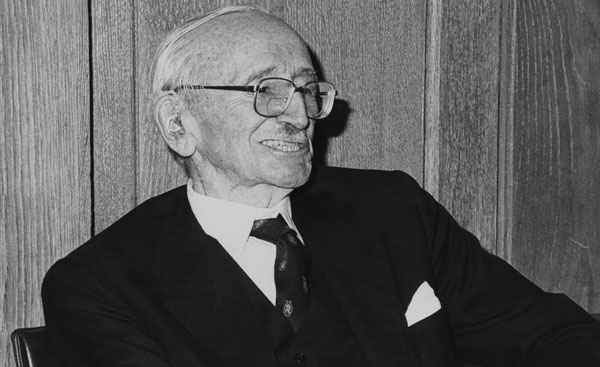The Fragility of Civil Society
By Richard B. McKenzie


Hayek’s various summary statements of this theme should rank in insightfulness in the social sciences with that of Albert Einstein’s equivalence equation in the physical sciences: E = mc2. Yet Hayek’s deduction that civil society must be the consequence of “spontaneous order” harbors an ominous potential, that of spontaneous disorder that can arise far faster than spontaneous order (and with everyone individually denying consequential responsibility).
In Hayek’s world view, informally adopted societal norms (or shared standards of behavior, which can be recast as behavioral limits) abet formally adopted laws (and vice versa) in constraining people’s worst proclivities to harm others and to make other’s behaviors unpredictable, which can undercut the general welfare. Norms have the added advantage of being less rigid than laws, as evidenced by their considerable variation across ethnic groups and regions. Thus, like laws, extant norms (say, “give a day’s work for a day’s pay” or “be honest, trustworthy, and kind”) can add to societal cohesion, stability, and general welfare. Some norms can also have negative consequences (as in “women should be treated as property or second-class citizens”).
As Hayek understood, norms’ survival can be precarious, subject to breakdowns that can develop more rapidly than it took for their discovery and development by our long-ago ancestors. No doubt, workable norms were continually revised and refined for greater effectiveness.
Contemporary Americans could be witnessing an escalating breakdown in societal norms, with each loss feeding the breakdown of others, like the spread of a contagious disease. Hayek didn’t dwell on this prospect, but I will in this short essay. My arguments rest on a well-worn conceptual foundation in economics, that of the “tragedy of the commons,” which is inherently unstable, because of the role of widespread volition in norms’ value and survival. The theme of this essay is that a breakdown in societal norms shares the same economic foundations as a run on a bank, although perhaps at a slower pace.
Social Norms
The count and variety of societal norms in the United States (or any country) is innumerable (especially if variations in norms to account for varying local conditions are counted). But I need only list a few American norms to clarify my construction of “norms,” and show that civil society, founded on an array of constraining rules or customs (and laws) is more fragile than generally recognized. Ergo, the ongoing and maybe self-perpetuating breakdown in contemporary civil order now evident in the halls of civil governments (including Congress); the streets of Los Angeles, Chicago, or D.C.; and even in the lecture halls of elite ivy-coated universities across the country. Readers can be forgiven if, from news reports, they worry that civil society is transforming into a cultural zoo (at least, in notable areas).
Many modern social norms appear to have evolved from an overarching “super norm” with biblical roots, otherwise known as the Golden Rule): In pursuit of personal ends, treat people with the respect and consideration you would want to be shown by others. My sample of derivative norms includes the following, especially relevant to my theme:
- • Take commitments seriously because of what they are, personal and legal obligations.
- • Respect legally obtained property rights (and resist the temptation to steal others’ rights).
- • Respect others’ rights to hold and express different views, even contentious ones.
- • Accept the outcomes of established, agreed-upon election and judicial processes (because elections, while imperfect, permit resolution of social conflicts without violence).
- • And, maybe most importantly, the M.L. King norm: Judge people by the content of their character, not by superficial characteristics, most notably skin color.
We must acknowledge that civil society, fostered by widely shared norms (and laws), has value because it is better than a likely alternative, the potential for disorder that can emerge when people individually do as they wish, without shared behavioral constraints.3
Hayek’s Evolutionary Foundation for Norms
In many of his writings, Hayek acknowledged the political necessity of formally adopted written constitutions and an array of laws developed to maintain social cohesion and order with minimal violence. More importantly for my purposes here, Hayek elevated the relevance of a far greater number of informally adopted and unwritten social norms that fortify formally-coded legal behavioral constraints. Hayek’s list of norms includes “customs, habits or practices which have been neither invented nor are observed with any such purpose in view.”4
Hayek posits that instead of being designed, a multitude of contemporary norms (as well as laws) evolved gradually over a very long stretch of time through Darwinian-type struggles for group improvement, survival, and spread. As Hayek poignantly observed, the reasons for the survival of many, if not most, of today’s norms is that they worked. By working, he meant that they evolved to afford people benefits (and cost savings), enabling them to increase the chances of their genes being passed on to immediate and distant future generations.

However, for today’s generation, the social and economic reasons for norms’ relative success and survival have been lost to history, which makes them hard to explain, justify, and defend when they are challenged by proposals for their dismissal or revision. Moreover, when many people obey the norms, each person can find it difficult to infer that his or her own allegiance contributes consequentially to the resulting societal cohesion and order. Therein lies a profound Achilles heel for civil order. People can individually relax on paying heed to norms without consequentially destabilizing civil society. If all act on similar thinking, rapid disorder can emerge.
Hayek’s evolutionary foundation for surviving norms also means that the full body of society’s norms can be contributing, without notice (or understanding), to contemporary societal cohesion and stability, but that these norms stand at all times as an unheralded “house of cards,” which can easily collapse with the noble goal of replacement with fiercely advocated “improved” norms designed for modern conditions. Hayek’s insights illuminate why so many people are distressed while watching nightly news, which is often filled with segments of flagrant violations of norms previously thought to be reliable, if not sacrosanct—for example,
- • disruptions of meetings of local boards of education, congressional hearings, and university classes by protesters (who insist they have the only way to ultimate societal redemption),
- • refusals of people to obey police orders (and who verbally abuse the police),
- • flagrant use in public settings of obscene language without regard for the sensitivities of others,
- • campaigns by student-loan borrowers to insist, with moral fervor, that others pay for their loans (even when used to acquire the elite educational privileges), and
- • a rampant spread in shoplifting, accompanied by a growth in organized smash-and-grab robberies by mobs.
The Tragedy of the Norms Commons
An alternative way of explaining the fragility of civil society organized around widely accepted norms is the “tragedy of the commons,” which suggests that unbounded individual actions can lead to outcomes detrimental to all (or most). The tragedy was first formalized by Garrett Hardin, a biologist, in the late 1960s.5 Hardin observed that if a pasture were held in common by the surrounding ranchers (that is, the ranchers did not have ownership or exclusion rights), then all could suffer a market outcome detrimental to all.
The ranchers have a common interest in restricting the use of the pasture by all to prevent overgrazing. However, each rancher has a cost-distorted economic interest in adding cattle. Each can reason that their own added cattle would eat grass, but the eaten grass would likely be a cost borne by other ranchers, causing them to have an “excessive” demand for adding cattle, leading to the pasture being overgrazed and the cattle being underweight when sent to market.6
Widely shared societal norms that effectively constrain individuals’ behaviors harbor the potential of benefiting everyone (or almost everyone). For example, a norm to the effect “don’t shoplift” can benefit all shoppers (and even non-shoppers) in a community. If (or to the extent that) all shoppers abide by that norm, retail stores’ “shrinkage” will be reduced, leading to lower prices and a greater variety of products, readily available on open shelves and racks. But their ready availability can increase the temptation shoppers have to “cheat” on the “no shoplifting” norm.
Product prices can rise as non-shoplifters yield to temptation and shoplifting spreads. And as shoplifting spreads (especially with reduced consequences), more initial non-shoplifters can be tempted to shoplift, partly because, with the growing count of shoplifters, the probability of being caught and punished (prospective shoplifting costs) can decline.
Some shoplifters can be expected to use modern technology to facilitate organized shoplifting. For example, they can use smartphones to bring together gangs of shoplifters at identified stores at specified times to participate in smash-and-grab robberies (with the mob overwhelming security guards and decreasing the shoplifters’ chances of being punished).
With the spread of all forms of shoplifting, the growing extent of the theft can drive shoplifters to move out of crowded markets of high-priced luxury goods to less crowded markets for “essentials” (such as baby formula and laundry detergent) and then move on to cleaning out UPS and Amazon delivery trucks, driving up the prices of more goods and adding to the incentive of non-shoplifters to shoplift with a ready-made excuse: “I tried to be good, but I can no longer afford my family’s needs.”
The end-result: Common goods (toothpaste and aspirin) are locked up, and commercial centers turn into retail “deserts.” Unfortunately, each shoplifter can claim that he or she alone did not steal enough to cause higher prices, much less the store closings: “The capitalists did it, obviously. They shuttered the stores!”
Norm-Breakdown Contagion
The spread of shoplifting can have all the markings of a contagious disease, as more people give in to the temptation that comes with an observation that “Everyone is doing it.” However, the contagion is driven not by a virus but by conventional economic forces, most notably the widely applicable “law of demand” that predicts a greater quantity demanded of a good (or activity) whose price (or cost) has fallen. And the breakdown in the do-not-shoplift norm can be, as it has been, abetted by considerations tied to softening shoplifting laws and excusing the individual shoplifters of responsibility, thereby lowering their costs.
Consider my short list of factors that can lower shoplifters’ expected costs:
- • The spread of shoplifting that, in itself, lowers probability of shoplifters being caught and punished,
- • Increases in the tendency to criminalize store owners’ efforts to stop or just impede shoplifting by physical force (or even calling 911),
- • Laws that lower shoplifting charges from felonies to misdemeanors,
- • The spread of a claim that people shoplift to cope with their economic and racial deprivations,
- • The acceptance of arguments that store owners accumulated their profits illegitimately, off the backs of their workers and customers,
- • A growing contraction of religion founded on a belief in an all-powerful God who rewards honesty and punishes transgressions,7
- • Widespread acceptance of findings that people (especially teenagers) don’t have full agency and that their behaviors are determined by forces beyond their control, reducing the consequences for their actions.
The confluences of the embedded economic forces in my abbreviated list of societal changes (along with many not mentioned) can compound their individual effects, because such forces can increase the counts of active shoplifters, lowering the social stigma of shoplifting and spreading police enforcement more thinly in more places. Of course, the development of online markets for stolen goods can also increase the profits of shoplifters.
Store owners face their own tragedy of the commons. All store owners may have an interest in curbing shoplifting by, say, physically stopping shoplifters at work in their stores. However, each can reason that their own prevention could result in expensive lawsuits, causing them to hire security guards only for “window dressing” with orders to not even try to impede shoplifters, meaning that the store owners themselves are adding to their inventory “shrinkage.”
Ironically, many shoplifters will favor enforcement of anti-shoplifting efforts because of their own commons tragedy: excessive competition among thieves and inevitable shrinkages in available goods for shoplifting.
The normalization of shoplifting can accelerate its spread, which can be self-perpetuating. More importantly, the breakdown of the no-shoplifting norm can cause people to question and challenge other norms, for example, “be respectful of other’s opinions in public forums.” Such a breakdown can foster “rhetorical arms races,” especially when political divides become chasms and unrelentingly partisan (and vicious). One unkind verbal assault can give rise to degenerative verbal point-counterpoint debates.
Concluding Comments
I have dwelled on the breakdown in the no-shoplifting norm because it readily clarifies how the demise of many norms can arise and self-accelerate. I could have focused on other norm breakdowns, for example, the norm requiring politeness among members in the Halls of Congress. In the 1960s, U.S. Senators were careful to address their colleagues on the Senate floor in respectful terms: “My esteemed colleague from the great state of South Carolina, the honorable Lindsey Graham…” possibly followed by an incisive argument, obliquely stated, on how Senator Graham’s proposal is intellectually bankrupt. Some of the old rhetoric remains in debates among senators, but it has recently been displaced with verbal combat, if not worse (in one case, an invitation to a fist fight over policy and personal differences), maybe aggravated by competitive political pressures to attract media attention.
Being a university professor was (early in my career) a noble profession bound by an array of conduct norms, a most prominent one being, “Leave partisan politics out of lectures.” Now, inserting political propaganda in lectures has been transformed into a moral obligation in many faculties. Many universities are now facing their own commons tragedy: Benefactors are withholding donations for fear of abetting campus discord.
The degeneration of the cohesion of societal norms can, unfortunately, advance at the speed of past runs on banks. Depositors and bankers alike can dread these runs, knowing that banks don’t have the cash on hand to fulfill depositors’ demands to empty their accounts, but runs happen, fueled by depositors’ knowledge that hesitation in demanding cash can result in no cash. The collapse of civil society founded on people’s allegiance to widespread norms can collapse with unexpected rapidity, and with a consequential loss in welfare and cohesion. (Consider how fast mob fights have broken out in high school hallways or gang gunbattles have erupted in neighborhoods.)
- The Legacy of Friedrich von Hayek. Seven-volume audio collection. Online Library of Liberty.
 Don Boudreaux on Reading Hayek. EconTalk.
Don Boudreaux on Reading Hayek. EconTalk.- “The Power and Pervasiveness of Spontaneous Order,” by Elaine Sternberg. Library of Economics and Liberty, July 5, 2021.
The fragility of civil society has been exposed for all to see on nightly news programs and on social media, leading many to worry, “Where will the unraveling end—maybe in total disorder or worse, guerilla warfare?” If Hayek could return from his grave, I suspect he would stress an obvious point that has evolutionary roots: The unraveling of civil society is now dramatically uneven, which offers hope, because many areas of the country retain their general allegiance to key norms promoting civility remain stable will be teaching unstable areas lessons on what they are losing. They will also remind everyone of the importance of another norm too often and too easily abandoned: People must face consequences—that is, costs—for their destructive and wanton misbehavior. Friedrich Hayek’s theory of civil order via evolved norms offers a form of implied hope, that long-term evolutionary forces will override the current wanton efforts of many to contribute to the breakdown in civil society and democracy via their redesign efforts.
Footnotes
[1] See F.A. Hayek, 1945. “The Use of Knowledge in Society,” American Economic Review, 35 (4; September, 1945), pp. 519–30.
[2] See Hayek’s classic: F.A. Hayek, 1944. The Road to Serfdom, Chicago: University of Chicago Press.
[3] For extensive discussions of social norms, see “Social Norms,” 2018. Stanford Encyclopedia of Philosophy, posted September 24.
[4] See F.A. Hayek, 1973. Law, Legislation, and Liberty Vol.1. Chicago: University of Chicago Press, p. 11.
[5] Garrett Hardin, 1968. “The Tragedy of the Commons,” Science 162: 1243–1248. See also The Tragedy of the Commons, by Garrett Hardin, in the Concise Encyclopedia of Economics.
[6] The tragedy of the commons is at the heart of the widely used “prisoner’s dilemma problem,” an arrest strategy police use to induce confessions from two or more suspects.
[7] See my longer discussion of the interconnections between belief in God and fortification of belief in God: Richard B. McKenzie, 1977. “The Economic Dimensions of Ethical Behavior,” Ethics, 87 (3): 208-221.
*Richard McKenzie is Gerken Professor of Economics emeritus in the Merage School of Business at the University of California, Irvine. He is the author of, most recently, The Selfish Brain: A Layperson’s Guide to a New Way of Economic Thinking.
For more articles by Richard B. McKenzie, see the Archive.
